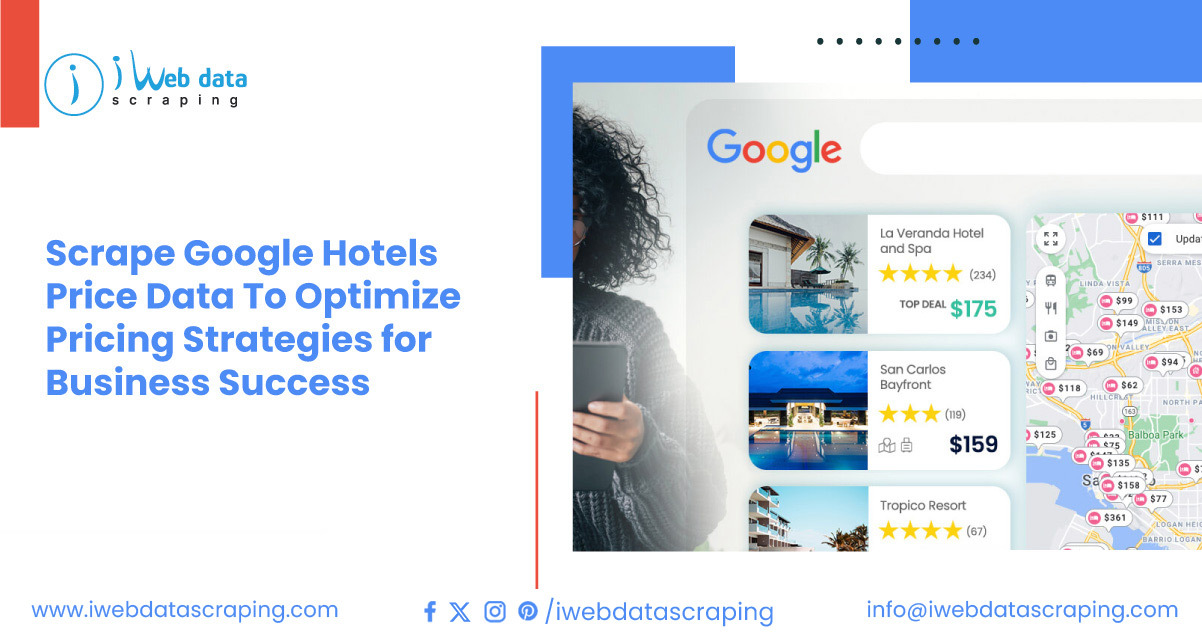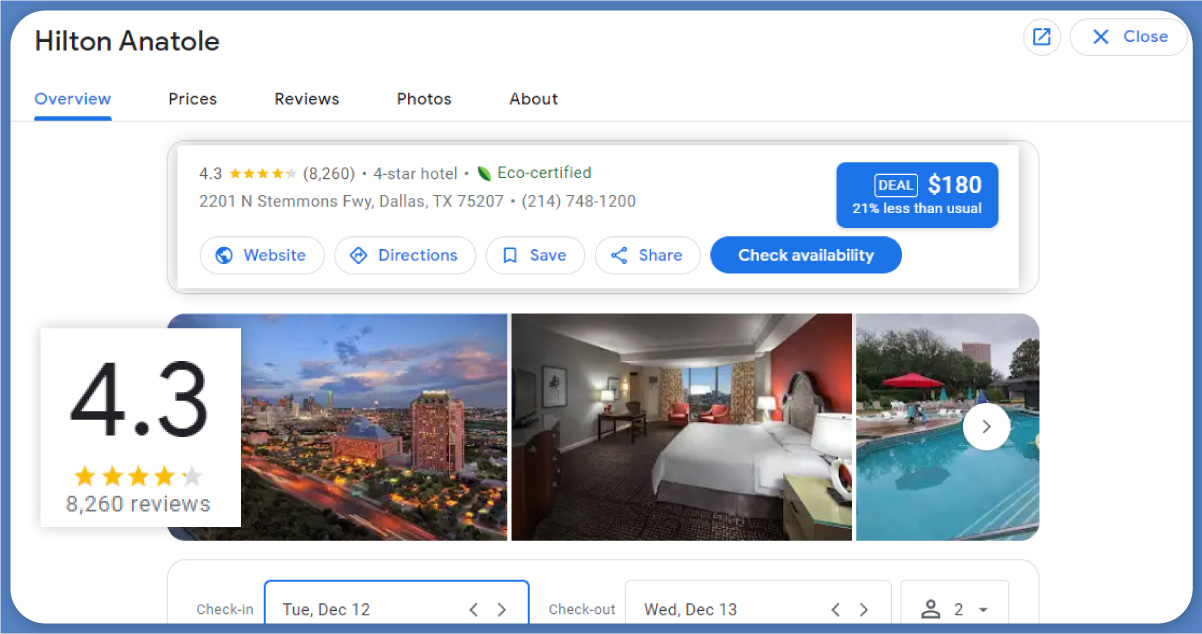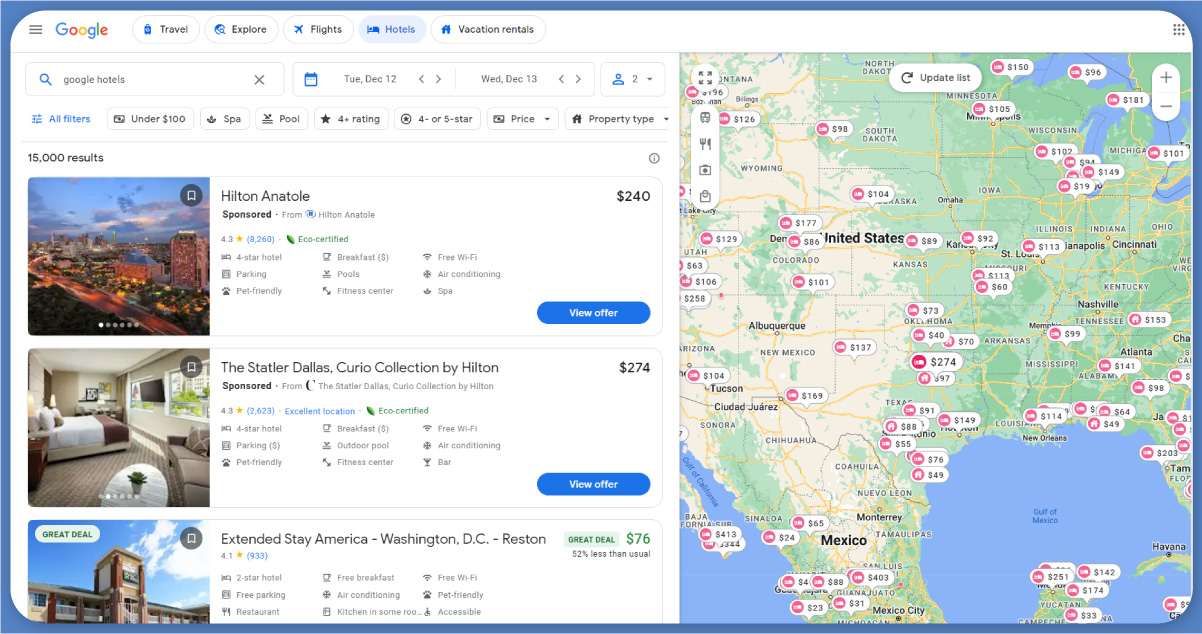

Google Maps stands out as a go-to solution for discovering hotels in a city. It offers a user-friendly and efficient way to locate all the hotels within a city, providing a comprehensive overview of their locations on an interactive map. To initiate a hotel search on Google Maps, enter "hotels" followed by the city name in the search bar. This action generates a list of hotels within the specified city, accompanied by their respective map locations.
Clicking on a specific hotel on the map provides access to detailed information such as the address, ratings, and reviews. If you wish to explore other hotel options in the city, you can easily zoom out or utilize the map controls to navigate different areas. Google Maps streamlines the process of finding hotels, offering convenience and valuable insights into amenities and ratings for each establishment.
Google Hotels data scraping enables users to extract and collect a wealth of information from the platform, streamlining the gathering of details about various hotels. This advanced technique involves automated tools and scripts that systematically navigate through Google Hotels to retrieve data such as hotel names, addresses, contact information, pricing, availability, and customer reviews. By harnessing hotel price data scraping, users can efficiently aggregate large datasets, perform market research, and make informed decisions related to accommodations. It offers a powerful means to analyze trends, compare pricing across different hotels, and gain valuable insights into the hospitality industry. However, it's crucial to approach data scraping ethically and in compliance with legal and ethical standards to ensure responsible and fair use of the extracted information.


Market Research and Competitor Analysis: Scrape Google hotel price data to allow businesses to conduct comprehensive market research and analyze competitor pricing strategies. This information helps businesses stay competitive by adjusting their pricing strategies based on market trends and competitor rates.
Dynamic Pricing Optimization: Businesses can implement dynamic pricing strategies by regularly scraping and analyzing Google hotel price data. It involves adjusting room rates in real-time based on demand, seasonality, and competitor prices, maximizing revenue and occupancy rates.
Customer Behavior Analysis: Understanding customer behavior is crucial in the hospitality industry. Scraping Google hotel price data helps businesses identify patterns in customer booking preferences, allowing them to tailor their services and marketing efforts to meet customer expectations.
Forecasting Demand: Accurate demand forecasting is essential for hotel management. Scraping historical and real-time pricing data enables businesses to predict future demand patterns, optimize inventory management, and ensure rooms are priced appropriately during peak periods.
Marketing and Promotion Planning: Hoteliers can use scraped data to design targeted marketing campaigns and promotions. Businesses can identify opportune times to offer discounts, packages, or exclusive deals by analyzing pricing trends, attracting customers, and increasing bookings.
Strategic Decision-Making: Informed decision-making is crucial for the success of any business. Scraping Google hotel price data provides valuable insights that can inform strategic decisions related to investments, renovations, and overall business development, contributing to long-term success.
Enhancing Customer Satisfaction: Knowing the market and competitor prices allows hotels to offer competitive rates, enhancing customer satisfaction. Additionally, businesses can identify value-added services or amenities that competitors may offer, enabling them to stay competitive in the market.
Compliance Monitoring: Monitoring pricing information on platforms like Google ensures that a business complies with industry standards and regulations. Regular scraping helps identify potential pricing violations or disparities, allowing businesses to address issues promptly and maintain a positive reputation within the industry.

Conclusion: Scraping Google Hotels' Price data is a strategic approach for businesses seeking a competitive edge in the dynamic hospitality industry. By meticulously navigating website structures, utilizing appropriate scraping tools, and adhering to ethical guidelines, organizations can extract valuable insights for market analysis, pricing optimization, and customer-centric decision-making. However, respecting legalities, handling anti-scraping measures judiciously, and maintaining compliance with website policies are imperative. Ultimately, harnessing Google Hotels Price data empowers businesses to make informed, data-driven decisions for sustained success in the ever-evolving landscape of the hospitality sector.
Feel free to get in touch with iWeb Data Scraping for comprehensive information! Whether you seek web scraping service or mobile app data scraping, our team can assist you. Contact us today to explore your requirements and discover how our data scraping solutions can provide you with efficiency and reliability tailored to your unique needs.